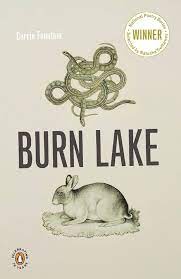
Yesterday I sent my message in two bottles to mentors-in-waiting Marie and Naomi (there’s a poem right there!). And, via the comments section, my good virtual friend, Carter, alerted me that I had stumbled upon a winner when I picked up Carrie Fountain’s book, Burn Lake.
For reasons I cannot fathom, the proof is always in the pudding (which we never eat in this household). Carter, a champion of the journal American Poetry Review, let me know that the latest issue offered up three coins, all of them Fountain’s.
A little research, and I discovered one of the three was posted live on the Net. It’s called “The Student”, and requires more than a passing familiarity with Jacques Derrida, some French philosopher or other famous for deconstruction. And although I am no philosopher, I do know a thing or two about deconstruction, having had more than one of my seaside sand castles destroyed by my older brother—this after hours and hours of construction on my part.
You see? Philosophy is easy. But it might not help you understand “The Student.” My suggestion is that you read it, then read it again. In time, your “ah’s” will begin to construct “hah’s!” and thus are Joycean epiphanies made.
Meanwhile, what started the whole discussion: I started the 2009 National Poetry Series winner Burn Lake last night. Apparently there are a series of Burn Lake poems within it. Here’s the first, which appeared in Poetry:
And here’s “Burn Lake 2,” the sequel, cooler still (if lakes be cool, and they do, at least up north):
“Burn Lake 2” by Carrie Fountain
All afternoon I’ve been swimming out
to the deepest part of the lake
and sinking down as far as I can
because for a long time now
I’ve wanted to feel dead and alive
at the same time
and for whatever reason I believe
this is the way to do it. So far,
it’s impossible to feel dead.
Instead, when I reach the cold sheets
of water toward the bottom of the lake
all the lights go on inside my body
and my legs pump, and before long
I see the determined lines the sun makes
on the surface of the water, and I reach
the living world again, the thin limbs
of the salt cedar wagging at the shoreline,
the wuzz of traffic on the interstate,
and my mother, far off, reading a paperback
on a little shelf of sand, smoking
one of those long , brown cigarettes
she slips in one sublime gesture
from out of a clicking leather case.
There is something that keeps
occurring to me in the moment I break
the water, though by the time I take a breath
I’ve forgotten what it was.
Strong finish, that. Subtle finish, too. A nice mix. A “how did she do that?” mix. Maybe Marie, Naomi, or Carrie herself can comment. Maybe they even will.
Meanwhile, back to swimming my own poetic lakes….